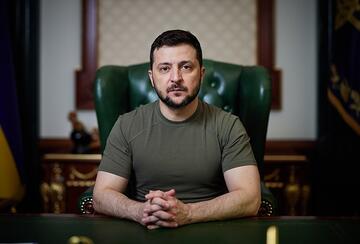
Ukraine is the victim of an unprovoked and unjustified war launched by Vladimir Putin’s Russia more than eight years ago.

Kevin McCarthy’s warning of no ‘blank check’ and progressive Democrats’ premature call for negotiations were unfortunate

Would Putin Roll the Nuclear Dice?
Would Putin Roll the Nuclear Dice?
"The hope is that rationality would prevail, and that senior political and military leaders in Moscow, who may not be so obsessed with Ukraine, would come down on the side of caution."

Seven and a half months after it began, Russian President Vladimir Putin’s war against Ukraine has not gone as the Kremlin had hoped. The Ukrainian military has resisted with skill and tenacity, in recent weeks clawing back territory in the country’s south and east. As the Russian invasion falters, concern has arisen that Putin might turn to nuclear weapons.

Following Russian President Vladimir Putin’s bogus September 30 annexation of four partially-occupied Ukrainian regions, Ukrainian President Volodymyr Zelenskyy officially applied for fast-track NATO membership.

On September 30, 2022, Russian President Vladimir Putin signed agreements illegally incorporating the Ukrainian oblasts of Luhansk, Donetsk, Zaporizhzhia, and Kherson into Russia. He said Moscow would “defend our land with all the forces and resources we have.” He previously hinted this could include nuclear arms. Nuclear threats are no trivial matter, but Ukraine and the world should not be intimidated. The West should respond with political and military signals of its own.

Putin's Disaster in Ukraine
Putin's Disaster in Ukraine
On Vladimir Putin’s order, the Russian army launched a new invasion of Ukraine in February. That has inflicted tragedy on Ukrainians but, seven months later, has also proved a catastrophe for Russia.
Rose Gottemoeller, Steven Pifer, Francis Fukuyama, and Michael McFaul discuss the complex life and legacy of the last leader of the Soviet Union.

Ending the fighting may well require talks, but the decision to negotiate should lie with Kyiv.

One. More. Time. It’s not about NATO
One. More. Time. It’s not about NATO
Vladimir Putin and the Kremlin had a number of reasons for invading Ukraine in February and starting the largest military conflict in Europe since World War II. Putin sought to portray the pre-invasion crisis that Moscow created with Ukraine as a NATO-Russia dispute, but that framing does not stand up to serious scrutiny.

U.S.-Russia relations, one year after Geneva
U.S.-Russia relations, one year after Geneva
The June 16, 2021 meeting in Geneva between U.S. President Joe Biden and Russian President Vladimir Putin gave a positive impulse to a bilateral U.S.-Russia relationship that was plumbing post-Cold War depths. Both sides made modest progress in the following months, only to be wholly derailed by Putin’s war of choice against Ukraine. It will be a long time before the U.S.-Russia relationship can approach anything that resembles “normal.”

During a period of greater hope for Russia tempered by uncertainties, President Bill Clinton sought both to enlarge NATO and build a strategic partnership between the Alliance and Moscow.

On June 1, 1996, two trains arrived in Russia transporting the last nuclear warheads that had been deployed in Ukraine when the Soviet Union collapsed.

The Russia-Ukraine war is entering its fourth month, with no end in sight. The Kremlin seems intent on achieving a victory on the battlefield, while relations between the West and Russia plummet to new lows. One casualty: U.S.-Russian arms control negotiations.
The Russia-Ukraine war at three months
Three months after Russia’s large-scale invasion of Ukraine began, the Russians have failed to achieve their objectives. U.S. officials now expect a war of attrition, with neither side capable of a decisive military breakthrough. How the war will conclude remains unclear.

In a May 5 interview with the Associated Press, Belarus dictator Alyaksandr Lukashenka expressed concern that the ongoing Russo-Ukrainian War could see the use of nuclear weapons. Lukashenka called such use “unacceptable because it’s right next to us.” He has good reason for concern.

What is Ukraine’s best security guarantee?
What is Ukraine’s best security guarantee?
Russia’s unprovoked and unjustified war on Ukraine has run nearly seven weeks.

All wars come to an end. One side may be conquered, the attacker may give up and withdraw, or the warring parties can negotiate a settlement.

On March 15, as the Russia-Ukraine war neared the three-week mark, Brookings experts held a discussion on developments in the conflict so far and what might be coming.
Tacit rules to avoid a NATO-Russia war
While the United States and NATO have sided squarely with Ukraine, the victim of an unprovoked invasion by Russia, US and NATO officials have also made clear their desire to avoid a direct military clash with Russia.
Russia vs. Ukraine: How does this end?
On February 24, Vladimir Putin launched the Russian military on what he termed a “special military operation,” his euphemism for a massive invasion of Ukraine.
Ukraine Under Siege: What's Next
As Russian forces advance into Ukraine from the north, south and east and lay siege to Kyiv and other major cities, join The Commonwealth Club for an in-depth briefing on the current situation and what may happen in the coming days or weeks.

Trying to justify Russia’s unjustifiable invasion of Ukraine, Russian President Vladimir Putin claimed that Kyiv sought to develop nuclear
weapons. That is a glaring untruth, as he well knows.
The Kremlin Paints Itself into a Corner
As the crisis between Russia and NATO and Ukraine has developed over the past three months, the Kremlin increasingly has painted itself into a corner.

President Joe Biden’s administration is conducting a missile defense review in parallel with its Nuclear Posture Review (NPR). Those reviews will determine whether to adjust the nuclear and missile defense programs that the administration inherited from its predecessor.







